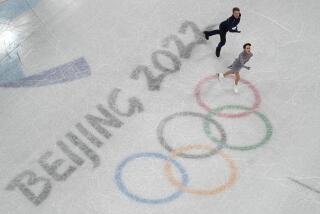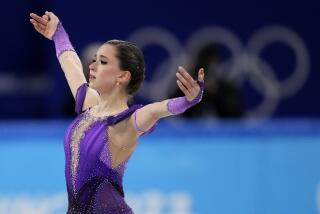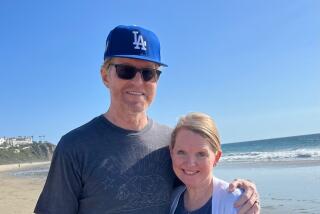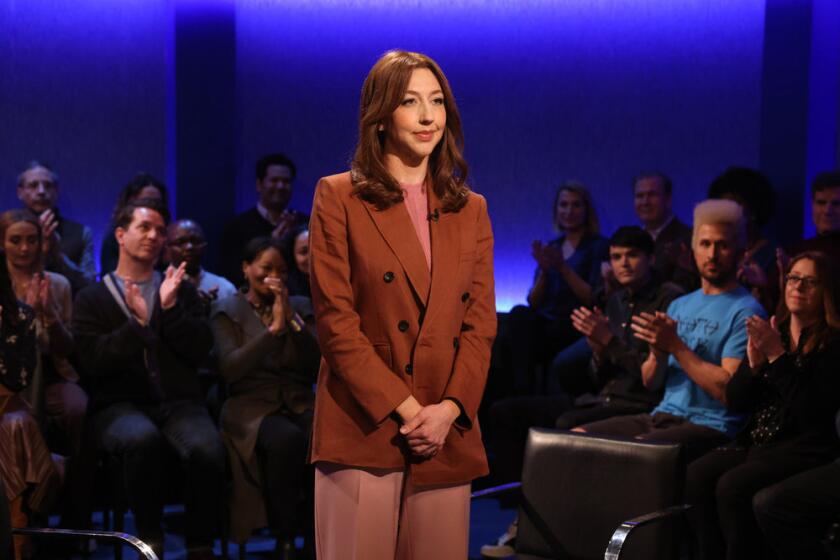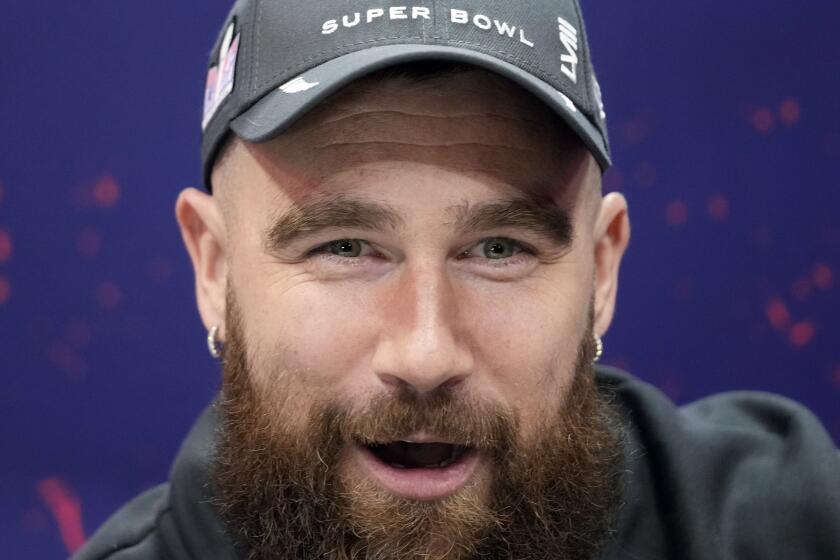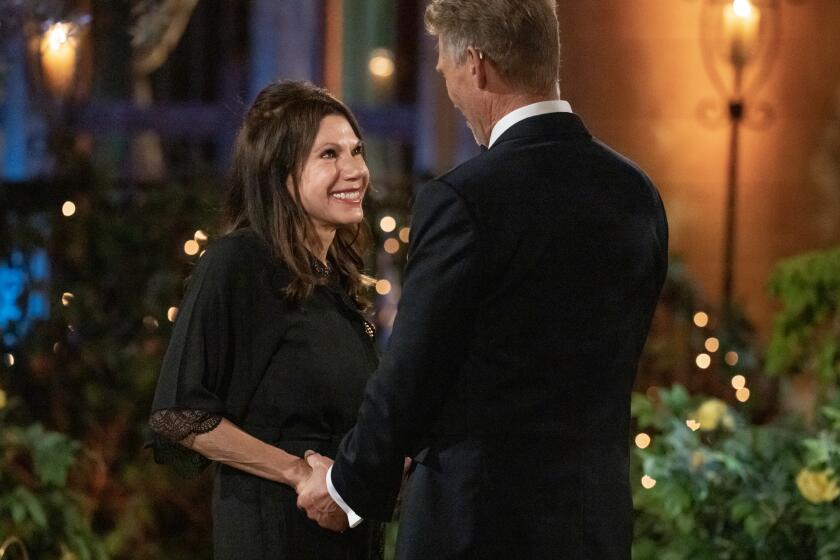Sochi Olympics TV moment: Pikus-Pace and the too-personal problem
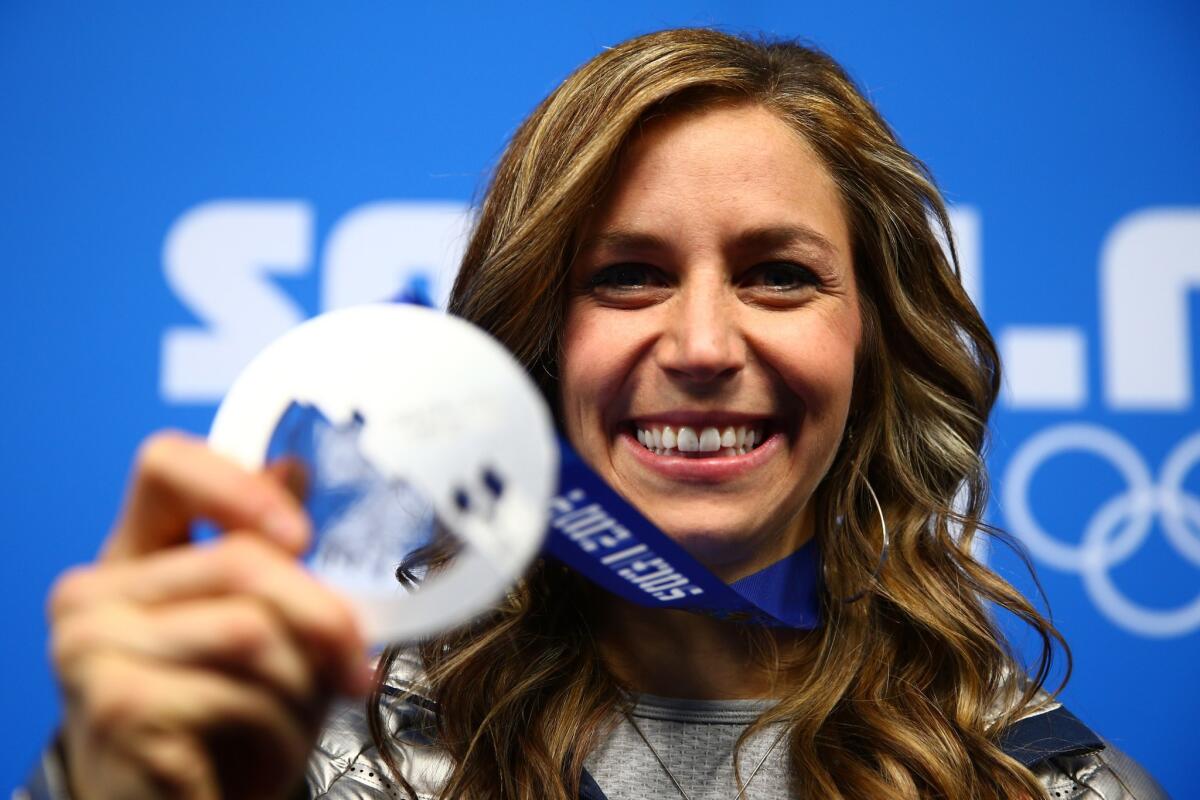
Let’s say you suffered an intensely personal tragedy. And let’s say you also happened to have an incredible professional triumph at an Olympics, coming back from retirement and beating the odds at well past athletes’ average age, in a sport that requires a level of kamikaze spirit found traditionally among the very young. And you not only competed but medaled.
Should you then, in taking a broadcast victory lap the day of your win, have to discuss that personal tragedy in front of a national audience?
That’s the situation as it unfolded for Noelle Pikus-Pace on Friday night. The 31-year-old American skeleton racer, who retired after a narrow medal miss in Vancouver in 2010 and decided to return to competition only about 20 months ago, surprisingly took silver in the event Friday.
PHOTOS: Winter Olympics in film
And, yes, she suffered a miscarriage several years ago, which if you didn’t know before -- and why would you, or should you -- you knew after interim Olympics host Meredith Vieira asked it point-blank in a studio interview.
It’s a testament to Pikus-Pace’s ebullience and can-do spirit that the moment wasn’t more awkward than it could have been. She mentioned it was a girl who passed 18 weeks into her pregnancy and talked about how her husband, Janson Pace, encouraged her to get back on the sled after the tragedy, offering a gritty laugh and not letting the potentially exploitative discussion ruin her post-race mood.
Tales of woe are plentiful at the Olympics, and plenty awkward -- every figure skater who has ever had a personal crucible has it aired by announcers, who take pains to point out to viewers any extended family members who’ve suffered a terminal illness or mental breakdown.
But this was different. Vieira raised the uncomfortable question to the competitor herself.
RELATED: Meredith Vieira steps in for an ailing Bob Costas
It’s of course possible Pikus-Pace had told producers she wanted to talk about it. Vieira brought up the miscarriage after Pikus-Pace had, in describing her post-retirement period, said vaguely that “Life happened.” So maybe that was a cue for Vieira to say “You had a miscarriage,” as she did.
But even if so, the discussion was the product of an Olympics TV culture that often puts emotional point-scoring above the other kind of point-scoring -- you know, the one on the course or rink. And that’s where it gets squishy.
Producers would justify all this by saying that a miscarriage is part of an athlete’s narrative. But Pikus-Pace wasn’t otherwise talking about it, we weren’t thinking about it, and frankly it had as much to do with what had happened Friday as any of a host of personal factors -- psychological, physical, spiritual -- that lead to an athlete deciding to undertake thousands of grueling hours of training and are generally considered irrelevant on game day. It certainly had little to do with how Pikus-Pace won the medal.
Incidentally, there was a larger bothersome turn to the personal in the interview, as Vieira circled back to what Pikus-Pace said to her kids when she triumphantly jumped into the stands after completing the last of her four runs. By a quick count, Vieira asked five questions about Pikus-Pace’s husband, children and personal life -- including one about her husband’s Valentine’s Day efforts -- compared with just two about the competition itself.
PHOTOS: Olympic Games TV moments worth remembering
Would she have asked all that of a man? Maybe. But probably not. We’ve all seen dozens of post-game interviews in which men bring their children onto the field or into the press conference room. Male tennis champions climb into the stands to hug their families all the time. Is there ever more than the occasional question about their interactions with their kids? That’s not because the kids don’t mean a lot to these men or because they’re not good fathers. It’s because at that moment it’s not central to what they did or didn’t do on the course or field.
It’s not just Vieira, who it should be noted, like “Today” co-host Matt Lauer earlier in the week, ably pulled double duty as Bob Costas recovers from a nasty pink eye infection. This kind of Oprah-ification of post-game interviews, in which I-feel-your-pain moments are shared for the purpose of manufacturing some instant sympathy, has gotten worse.
At the same event where Pikus-Pace medaled, trackside interviewer Lewis Johnson asked her American teammate Katie Uhlaender -- just moments after she missed a bronze medal by four-hundredths of a second -- how her father, who died a few years ago, would have felt watching her performance. Within seconds, Uhlaender began choking back tears.
PHOTOS: Celebrities by The Times
It was a “question” with little redeeming value or potential insight -- presumably he would have felt, you know, proud. Instead it was simply designed to evoke an emotional response. Johnson could tell himself he was asking the tough question. But he wasn’t. He was asking a question designed to make Uhlaender emotional -- and make us feel sympathy.
If you’ve watched figure skating you’ve seen this same sentiment creep in several times in the last week, as rinkside reporter Tracey Wilson has asked skaters about their “difficult year,” code for a tragedy or crisis that has happened -- and “what this means.” It’s a question that won’t and doesn’t ever yield anything substantial (it’s usually answered with “it means a lot”) but is simply meant to communicate to us that this person was recently grieving or struggling in some way.
We’ve gotten used to broadcasters imposing personal arcs on stories of Olympic achievement, the trotting out of hardship to make more meaningful (though in fact to cheapen) a genuine athletic feat. This new strain of getting athletes to talk about a death is a troubling extension of that. At best they’re questions that make everyone feel squirmy. At worst, they trade in a kind of emotional voyeurism.
There are many genuinely amazing achievements -- broadcast effectively by NBC -- over the course of an Olympics. Athletes like Pikus-Pace and Uehlander just had a couple of them on Friday. They deserve a little better after their shining moments. We probably do too.
ALSO:
Sochi Olympics TV moment: Slopestyle sweep, Skating slip
Sochi Olympics TV moment: Shaun White’s loss is NBC’s gain
Sochi Olympics: Figure skating and that pregnant pre-score moment
More to Read
The complete guide to home viewing
Get Screen Gab for everything about the TV shows and streaming movies everyone’s talking about.
You may occasionally receive promotional content from the Los Angeles Times.
